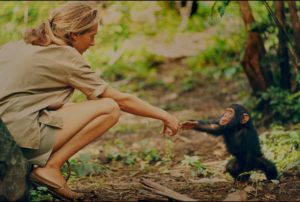There is a dominant mainstream in any field and when its pioneers and trailblazers succeed, they are not a part of it! This astonishing fact should really upend all our thinking about what it takes to succeed. Instead, it is conveniently ignored!
Why?
The dominant mainstream enjoys an unparalleled hegemony over the hearts and minds of the numerous faithful. They have invested a lot into creating a collective faith about the field and its tenets for success. Breaking off from it is painful and entails a lot of hard work, struggle and resistance.
What does this dominant mainstream do?
It specifies the dos and don’t s of the field, the paradigm to use, the approach to take; all of which taken together, becomes an orthodoxy. This orthodoxy prescribes how everything ought to happen. Its word is the last law and field-work follows it like a sacred ritual.
When Jane Goodall,the primatologist and anthropologist, began her field work in studying chimpanzees, she had no scientific training! She had studied biology in school, that’s all. She was not aware of what the dominant mainstream thinking was on the subject of animal behaviour. Why then was she chosen by Louis Leakey, an eminent paleo-anthropologist of that time? Leakey was impressed by the sheer knowledge Goodall had about the animal world, all of which she got from reading. No, he did not dismiss it, as modern-day cynicism would have us do.

Pic Courtesy – Science Friday
And Leakey found her to be gifted at perhaps the most demanding aspect of this kind of fieldwork, the ability to patiently observe and study animals for unending hours in the wild. Goodall aced this requirement. The wise Leakey signed her up for the field-work. He disregarded the dominant mainstream dictate on who to select on what basis. He saw Goodall’s talent and potential and chose her.
Interestingly, Jane came to know what she was unencumbered by only after her breakthrough field-work. Leakey asked her to go to university and there she was told everything she did in her research and field-work was wrong!
Firstly, she had given names to chimps, thereby individualizing them. The deemed focus was to be on the collective and the group. Assign numbers, not names. Jane did just the opposite!
Secondly, she had observed the chimps to have different personalities. They showed evidence of thinking minds and revealed emotions. According to the wisdom of the day, animals were not supposed to have personalities, minds, and emotions. Only humans had them.
Finally, Jane openly displayed empathy for the chimps. Scientific study emphasised on being cold, objective and unemotional; not relating to the object being studied.
The refreshing part of Jane Goodall’s approach is that she was informed and guided by what she herself saw and felt until that point of time in her life. The courage of her convictions stemmed from her own-life experience. She did not discount it simply because it was only one individual’s experience. She loved her dog, Rusty and knew Rusty to have a personality. And this individual insight matters!
For Jane, empathy was crucial. When she observed a baby chimp behaving in an erratic way, she considered how a human baby would behave in a similar context; this contextualising helped her to form tentative meaning. After an emergent insight borne out of empathy, she knew it was time to step back, and make a detached observation about whether the tentative meaning and emergent insight has any validity.
In fact, Jane had an unforgettable encounter with a chimp who most responded to her. She had named him David Greybeard. She offered David a piece of fruit. He took it. And immediately let it drop. Then, David caught hold of her finger and lightly squeezed it; a behaviour richly soaked in meaning and significance. If she had not created a context for such behaviour by trying to relate, she would never have experienced this magical moment of reciprocal empathy by David!
Jane shares a memorable childhood incident that reveals how her mother, Margaret, nurtured her interest in the animal world. When she was four years old ( this was in the 1930s), they had gone to a farm that had multiple henhouses. Jane was always curious about where the hen’s egg came from. Nobody was telling her! So, one day she disappeared from human sight and crouched inside a henhouse. It frightened the hen who ran away. Undeterred, Jane somehow managed to squeeze into another henhouse and waited for a hen to appear and reveal her secret! All this while, a frantic search was going on for her. Even, the police were informed.
After agonising hours, her mother saw Jane running excitedly towards her. She saw Jane’s excited eyes and knew something was afoot. Jane narrated how she had finally seen a hen lay an egg! She had been missing for four hours! Notwithstanding that, her mother just kept quiet about all the anxiety and fear caused by Jane’s disappearance. And refrained from reprimanding Jane in any way. This moment of reckoning reveals how a lifelong passion hangs in the balance for young, impressionable minds. If we are lucky, a spirit of nurturing by elders, keeps us on course in the quest to find and develop our passion and life-purpose!
To know exactly what was special about Jane Goodall’s path-breaking work, you can watch this
Complement your viewing with this podcast episode – Jane Goodall on What it means to be human.
Very well researched. Also the words u use are simple and easy to understand.
What I liked most is spirit of nurturing by elders, keeps us on course in the quest to find and develop our passion and life-purpose!” a lesson for many.
Thank you for your appreciation, Sejal!